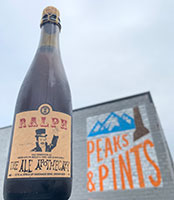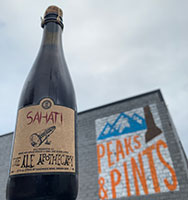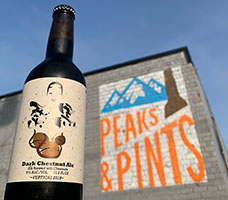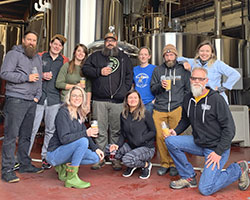 Trees provide an indispensable service. They block the sun, color the landscape, and give us something we can truly look up to. And the extra oxygen? Yes, trees filter countless pounds of CO2 though all those sun-dappled branches to make us healthier. And happier. Because of pine trees. We mean, clearly. They also stand silently as physical corroboration of the passage of time, tangible proof that the world existed before we happened to arrive at a given spot. Sadly, many millions live nowhere near a good, healthy clump of trees, much less a deep, funky forest that, within minutes of entering, works some feral voodoo on your id and makes you realize, with a profound karmic thump, “I just might have this rat-race thing all wrong.” The only trees in those sad people’s lives are tree-flavored beer. Ah, you knew that was coming. After all, this little ditty is all about today’s beer flight, which is, obviously, Craft Beer Crosscut 11.3.19: A Flight of Trees. Yes, we talking beers brewed with actually trees or hops with pine notes. Cheers!
Trees provide an indispensable service. They block the sun, color the landscape, and give us something we can truly look up to. And the extra oxygen? Yes, trees filter countless pounds of CO2 though all those sun-dappled branches to make us healthier. And happier. Because of pine trees. We mean, clearly. They also stand silently as physical corroboration of the passage of time, tangible proof that the world existed before we happened to arrive at a given spot. Sadly, many millions live nowhere near a good, healthy clump of trees, much less a deep, funky forest that, within minutes of entering, works some feral voodoo on your id and makes you realize, with a profound karmic thump, “I just might have this rat-race thing all wrong.” The only trees in those sad people’s lives are tree-flavored beer. Ah, you knew that was coming. After all, this little ditty is all about today’s beer flight, which is, obviously, Craft Beer Crosscut 11.3.19: A Flight of Trees. Yes, we talking beers brewed with actually trees or hops with pine notes. Cheers!
Craft Beer Crosscut 11.3.19: A Flight of Trees
 The Ale Apothecary Ralph
The Ale Apothecary Ralph
7.75% ABV, 20 IBU
A more tree-laden beer than Ralph you’re not likely to find; white fir is added for powerful, herbaceous hits of pine and sage. Made of Oregon barley and crystal malts, The Ale Apothecary’s wild ale receives aged Cascade hops and white fir needles during the boil copper. Then, it’s aged in fresh wine barrels with another dose of white fir needles prior to bottle conditioning with honey, the signature characteristics of this beer come from the white fir, wild ale’s green apple acidity, the fresh wine barrels, and the Bend, Oregon brewery’s yeast culture.
 Ale Apothecary Sahati
Ale Apothecary Sahati
9.58% ABV
Beer writer Michael Jackson called Finnish sahti, “the only primitive beer to survive in Western Europe.” Sahati is Ale Apothecary’s Pacific Northwest interpretation of traditional Finnish sahti that peasants learned to brew in the 1500s. Starting with a 200-year old Engelmann spruce tree felled on the brewery’s property, Arney created his own kuurna (an ancient Scandinavian lauter tun) to separate the wort from the grain during brewing. The bottom of the kuurna is layered with spruce branches; the needles act as a natural filter and impart resinous oils into the wort. The hollowed-out trunk of the tree also contributes spruce essence and structure from the raw wood. Brewed with barley and rye malts, along with a sparing addition of Goschie Farms Cascade hops, Sahati hits the nose with spruce, eucalyptus, wood, citrus, and subtle almond and honey. The flavor follows the nose with subtle alcohol and a speck of mint.
 Hideji Beer Kuri Kuro Stout
Hideji Beer Kuri Kuro Stout
9% ABV
Chestnut trees and their nuts are attractive to a wide range of wildlife, from insects to mammals, as a food source. The wood of a chestnut tree makes for an attractive and durable timber. The chestnut is the most ancient fruit in Japan. Charred chestnuts have been found in and around archaeological sites of the Jomon Period (10,000-200 B.C.) settlements. Once peeled, harvested chestnuts can be eaten raw, deep fried, roasted, and added to beer. Indeed. In fact, Hideji Beer Brewery brewed Kuri Kuro Stout with hometown Miyazaki-grown chestnuts, for flavor rich in nuts, herbs and sweet chestnuts along with an aroma of espresso and brown sugar from roasted barley.
 Kulshan Tree-dimensional IPA
Kulshan Tree-dimensional IPA
6.4% ABV
Kulshan Brewing collaborated with Peaks & Pines on the Tacoma craft beer lodge’s house beer, Tree-dimensional-IPA. Paying homage to the outdoor enthusiasts who join Peaks daily in Tacoma’s Proctor District, Tree-dimension IPA is the perfect beer to toast the powder, currents or trails, as well as revealing the sprains. Tree-dimensional IPA, or Tree-D, continues Peaks & Pints’ love affair with old school piney IPAs, this time brewed with Simcoe, Idaho 7, CTZ, Centennial, and whole leaf Cascade in the hop back for all the pine, plus creamy mouthfeel and bitter finish.
Sierra Nevada Northern Hemisphere Harvest Wet Hop Ale
6.9% ABV, 67 IBU
Sierra Nevada Brewing’s Northern Hemisphere was the first wet hop ale and it inspired the wet hop craze in America. Wet, undried hops go straight from the fields into the Chico, California brewery’s kettles within 24 hours. Because hops are incredibly perishable, using hops wet preserves all of the precious oils and resins for a unique drinking experience. Brewed with wet Cascade and Centennial hops, this IPA has flavors of really oily, pine-y tree sap, as well as crusty, borderline burnt toast-like malt.
